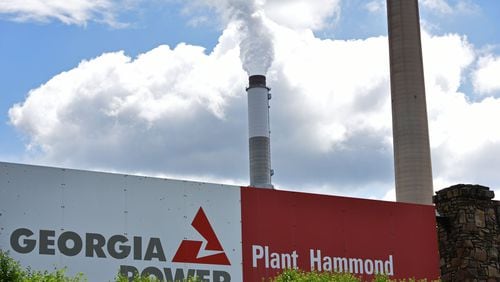The Trump administration has moved to delay Obama-era wastewater rules for coal-fired power plants, possibly scuttling environmental groups’ efforts to get tougher water quality standards for a Georgia Power plant near Rome.
Last week, Scott Pruitt, the new head of the federal Environmental Protection Agency, said it was “in the public interest to reconsider” a 2015 rule requiring power plants to use the most up-to-date technology to remove lead, arsenic and other toxic metals from their wastewater.
The rule begins taking effect in 2018, but power plants have until 2023 to comply in some cases.
That latter deadline is what Georgia’s environmental regulator is using to enforce the tougher federal standards in a proposed new wastewater permit for Georgia Power’s Plant Hammond, according to an environmental group. By then, the Trump administration may scuttle the tougher rules, the group said.
The proposed permit “basically gave them as much time as possible to meet the new standards,” said Chris Bowers, senior attorney for the Southern Environmental Law Center’s Atlanta office. “If the Trump administration decides to suspend that, then it may impact everything.”
Georgia Power and the Georgia Environmental Protection Division disagreed, saying some tougher limits will take effect as soon as the permit is approved. Both declined to comment on the Trump administration’s move.
“We will not speculate on potential future regulation,” said Georgia Power spokesman John Kraft.
Pruitt said the EPA plans to postpone deadlines for the tougher wastewater standards, which the agency said will cost the utility industry hundreds of millions of dollars annually to meet. The rules also have been challenged in federal court.
But the Sierra Club and other environmental groups said the EPA’s action ignores the health threats to people and wildlife.
Power plants are the largest industrial source of toxic wastewater in the nation, according to the Sierra Club. The environmental group sued the Georgia Environmental Protection Division earlier this year to push it to update permits at Plant Hammond and other Georgia Power coal-fired power plants.
But without stricter controls, the EPD’s new proposed permit allows continuing fish kills on the Coosa River from heated water from Plant Hammond, said Bowers. The 63-year-old plant doesn’t have a cooling tower.
Bowers said an earlier study by Georgia Power estimated that the plant kills up to 60,000 fish a year in the Coosa River.
“That is a grave concern. This is a very sensitive and unique, biologically diverse river,” he said.
The permit also could limit public input in the future on Georgia Power’s plans to eventually empty water from nearby coal ash lagoons into the river, he said.
Arsenic at higher levels than state law allows has been detected in a test well at Plant Hammond.
Officials at the Georgia Environmental Protection Division and Georgia Power disputed some of the environmentalists’ complaints.
Audra Dickson, of the EPD’s watershed protection branch, said the new permit will control releases of heated water by limiting the plant’s operation when water levels in the river are low. That limit will go into force as soon as the new permit takes effect.
Dickson said another rule won’t take effect until 2023 after the EPD concluded Georgia Power couldn’t meet the requirements by next year. That deadline applies to the permit’s limits on wastewater from removing sulfur from the plant’s coal-burning power generators.
“Upon the completion of the public participation process, EPD will review the comments received and make a permit determination” on that provision, Dickson said in an emailed response.
Dickson said Georgia Power is currently allowed to discharge treated wastewater from its coal ash ponds into the Coosa River, but as a “precautionary measure,” it will require the company to submit a “dewatering plan” for the agency’s review.
As part of its plans to shut down all the ash ponds at its coal-fired plants, Georgia Power plans to “dewater” — or remove all the water from — some of the ponds before sealing or excavating the sites and recycling the ash for concrete or other uses. Environmentalists fear it could stir up the sediments, releasing more toxic metals into the wastewater.
Kraft, with Georgia Power, said the environmentalists’ complaints are “misleading and inflammatory.”
He said the water from the ash ponds will be treated to remove the toxins.
Likewise, Kraft said the water coming from Plant Hammond “is not untreated or hot,” and meets the plant’s current wastewater permit. He said the new permit’s more stringent controls on water heat limits will take effect when the new permit goes into effct.
While not disputing the fish kill estimates in the Georgia Power study cited by the environmentalists, Kraft said it was “an unofficial, one-time study more than 10 years ago that was never finalized.”
Kraft said arsenic “slightly above the state’s standard” was found in two samples in one of 32 test wells at Plant Hammond, and that monitoring will continue after the ash ponds are closed.
“We believe the results from this well may be linked to historic herbicide use at a nearby substation,” he said.
Two sides of the EPA’s power plant wastewater rule
“Some of our nation’s largest job producers have objected to this rule, saying the requirements set by the Obama administration are not economically or technologically feasible within the proscribed timeframe.”
—EPA Administrator Scott Pruitt
“The (Obama-era) EPA made the right call in finalizing strong clean water protections against coal plants dumping toxic heavy metals into our waterways. Despite all this, Trump’s EPA Administrator is trying to throw it all away to placate polluters who could care less about the health of our communities.”
—Mary Anne Hitt, director of Sierra Club’s Beyond Coal campaign






